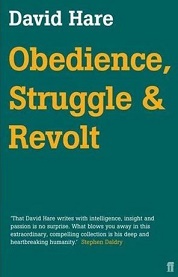| Polemic from Playwright Offstage |
Theatre Writer Book |
| David Hare “Obedience, Struggle and Revolt” , Faber & Faber , March 28, 2008 |
 “The Vertical Hour” this winter was fascinating but frustrating. The Guardian liked it as a Shavian play of ideas. On the other side were “does the cause of serious drama few favours”, “garrulous”, “dessicated”, “likely to leave many in the audience prone with boredom”, “laboured, join-the-dots preachiness and great waffly chunks of dialogue that go nowhere”, “oppressively argumentative”, “almost entirely lacking in imagination.”
“The Vertical Hour” this winter was fascinating but frustrating. The Guardian liked it as a Shavian play of ideas. On the other side were “does the cause of serious drama few favours”, “garrulous”, “dessicated”, “likely to leave many in the audience prone with boredom”, “laboured, join-the-dots preachiness and great waffly chunks of dialogue that go nowhere”, “oppressively argumentative”, “almost entirely lacking in imagination.” Debate is good. The question lingers as to why the play frustrates. The answer may be there in David Hare's most recent book of prose pieces. “Obedience, Struggle and Revolt”, subtitled “Lectures on Theatre”, also divided its reviewers. The case for was put by Rafael Behr for the “Guardian.” “He has fought tirelessly to present people with spectacles that might move them with cruel honesty about the world and thereby fight injustice. He has despised theatreland's love of mouldy relics from the classical repertoire propped up with middle-class angst or, worse still, with aristocratic wit. Better outrage than complacency.” Johan Hari for “the Independent” offers a different reading. Hare delivers a eulogy to John Osborne in the church of St Giles in the Fields. Osborne, says Hare, is “our poet laureate of flopsweat, of lost opportunity, of missed connections and of hidden dread”. Hari takes objection to Hare's sharp bifurcation. “He is furious that, in contemporary accounts of theatrical history, “Samuel Beckett's “Waiting For Godot” has displaced Osborne's “Look Back in Anger” as the turning-point in 20th-century drama. He wants a theatre of Jimmy Porters hacking bile at their audiences, not of bemused tramps asking gently, "We're not starting to mean something, are we?" “There are a few problems with Hare's attempt to marshal Osborne in this way” says Hari. “Was he in any meaningful sense a political artist? And was he any good anyway? Hare claims Beckett borders on nihilism and offers his audience no vision of positive change, but isn't there far more nihilism in the incoherent and howling rage of Osborne? When Hare tries to outline his hero's political agenda, he descends into (uncharacteristic) banality, saying "in Osborne's values, you find a love of emotion, of high, true, uncensored feeling", and that he offers "a highly romantic gesture of defiance in defence of the individual". Osborne's key insight is apparently that, "because we are all going to die, it is therefore extremely important what we do now." How is any of this political? Who doubts that it is extremely important what we do before we die? Hari on Hare raises the temperature. “Hare smothers his texts with so much self-importance that it becomes hard to follow his argument. He persistently presents himself as the tortured victim of dark forces. He says the supposed attempt to undermine political art "borders on an Oliver Stone-style conspiracy", and he is the victim of people who "seek to destroy us with neglect". Yet he then (in direct contradiction) fumes at the decision of a few London critics to fly out to see his new show in Australia: "In this business your enemies will follow you to the end of the earth." Come on, it's hardly the Mafia, is it, David?” Hare and I have shared the same country but not the same perception. “Nothing is more dangerous in his eyes than the ease with which our society slips back to a default position of supine deference to the establishment” says Behr. The period of our lives is not so far apart. Mine was a Britain- his is always and repetitively England- that took in simmering civil war, riot, strikes and power outages, the whole panoply of the unburied dead in 1979. Gender, sexuality and race relations have been transformed. Not so for Hare for whom “Theatre has changed as little as society.” The book has a characteristic assembly of quotations. Intriguingly they include Chekhov saying It is not the business of writers to accuse or to prosecute. We have enough accusers, prosecutors and gendarmes without them.” There is in the prose as in the plays too many an aphorism that reduces its subject. “John's subject is essentially failure” is Osborne reduced. But in all drama someone ends up failing in something."Of all British playwrights of the twentieth century, he is the one who risked most.” Eye-catching but true in any way? The admissions sometimes admit too much. “Playwrights don't get out much” he says in a speech. The key to understanding Hare is that he is a moralist, fiercely and unchangeably. We know thunderingly what he is against but like Orwell writing about Dickens it is not so clear what he is for. He does not like conservative government but he does not like his lot much either. “People are tired of being lectured...that there is no alternative to a cowardly Labour government. They know there is. It's a courageous Labour government.” But we have no idea what his ideas might be for courage in action. “The Vertical Hour” has a dominant figure in Oliver, the father in passive rural retreat. I thought it “dialectically limp in that Oliver as a character is not a lot more than a collection of wry and caustic attitudes.” A pause for reflection that character and character-maker are not so far apart. |
Reviewed by: Adam Somerset |
This review has been read 1496 times There are 34 other reviews of productions with this title in our database:
|
